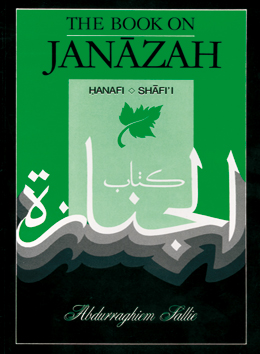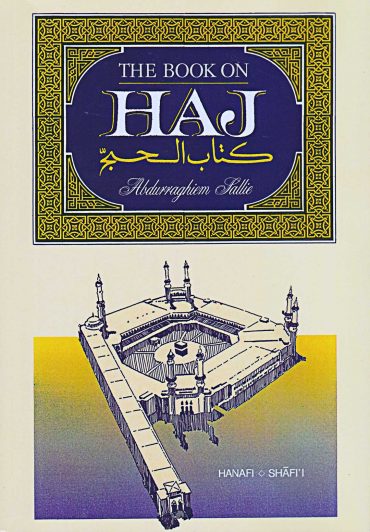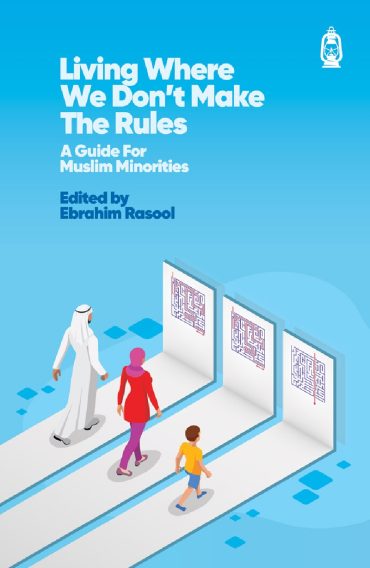-

Abdurraghiem Hasan Sallie
Janazah
by: Abdurraghiem Hasan SallieR69.99

Death is the final separation of the soul from the physical body. In this book, the author provides full details of the final rites to be accorded to the dead, such as instructions for the washing of the corpse. The views from the perspective of the four matha-hib are provided and further elucidates the various aspects of burying a Muslim with dignity. The step by step method of performing the last ghusl (ceremonial bath) to the shrouding (kafan) of the corpse is explained in simple and easy to understand language. A perspective is also provided on crying and lamenting
A perspective is also provided on crying and lamenting over the dead, burying at night, grave exhumation and visiting the graveyard. The iddah of the wife is fully expounded upon. The punishment in the grave and the subject of Tawassul (request/entreaty) and wasilah (medium/intercession) has been added for the serious student or reader of Islamic literature.
SKU: jan-01-s
Publisher: Red Kufi Books
Publish Date: 1989
Page Count: 273
“Janazah” Cancel reply
-
A Comparative Study of Inheritance in Islam by: Abdurraghiem Hasan Sallie R119.99
In this 376-page publication, Abdurraghiem Hasan Sallie provides an insight into the laws pertaining to Inheritance in Islam. Using and translating prepared works by Dr Taha Abdul Aziz Abu al Fadl, an Al-Azhar University professor and one of his teachers, the author not only expounds upon how the shares of inheritance are calculated and allocated but also how those very same laws are compared in relation to other belief systems.
Sketching a background to Islam’s position on the subject, Sallie takes the reader through inheritance laws before the advent of Islam, under the Egyptians, the ancient Greeks, and Romans and in parts of Europe as well as Russia.
For the Muslim reader, he details the laws and ramifications of inheritance according to the four major schools of thought (Madha-hib). Amongst the detail provided in this book is the inheritance of the unborn child as well as the Quranic texts on determining the shortest period of pregnancy, the decree of the inheritance of a missing person as well as that of the illegitimate child. The distinction between the inheritance of a woman and man has valid reasons, according to the Shariah (Islamic law), which is clarified in the book. The compulsory stipulated shares as explained in the Qur’an are diagrammatically explained by way of examples.
This book is certified and endorsed by the Al-Azhar University, Cairo, Egypt.
Excerpt
“If we compare the system of inheritance in Islam with that of other religions on earth, then any honest investigator will come to one conclusion – that the method advanced by Islam has no comparison in its justice and precision. It had no equal before the advent of Islam and neither will it have an equal amongst the most intelligent and advanced communities.”
-
Haj – Hanafiy & Shafi’iy by: Abdurraghiem Hasan Sallie R99.99
Every Muslim is enjoined to perform Haj at least once in a lifetime when he/she is by the means to undertake such a journey. Today the cost of completing this journey is quite substantial, and it is, therefore, sensible to perform the rites of Haj correctly as intended by Allah and His Messenger ﷺ.
This comprehensive and in-depth publication expounds the manner and method of performing the rites of both Haj and ‘Umrah by both the Shafi’i and Hanafi schools of thought. It discusses in detail the history of Haj and its directive, virtues, compulsion, when it became far, the excellence of Makkah and its grade above Madinah. It further discusses each and every principle and action of Haj from the niyah, the donning of the ihram and its ramifications, the rules for the correctness of Haj, the rules of tawaf, the sa-‘im, the sunnan of wuqoof, its wajibaat and its significance. The rites to perform during the five actual days of Haj and the pelting of the Jamaraat as the Prophet Muhammad (PBUH) performed it are discussed in detail. Added benefits are the detailing of subjects such as the origin of zam-zam, qasr (shortening the salah) Salah, the joining of two prayers, the hadee and the Qurban, visiting the grave of the Prophet and the graves of his Companions.
The du’ahs for all the rites are provided both in Arabic and in English. The discussion of celebrating Eid-ul-Adha with Makkah has been added, detailing the dispute, the sighting of the new moon, the fatwa (judgement) from the Shaykhul-Azhar (Head of the Al-Azhar University in Cairo), the universal Islamic calendar and the conclusion.
Numerous Qur-’anic texts and Ahadith are cited to prove to the reader that there exists only one way of performing Haj and that is the correct way.
Excerpt
“Righteousness can only be attained if we follow and observe the principles which lead to righteousness. To perform a righteous Haj we must first know the meaning of the word Haj, its purpose, significance and the rules and regulations of these rites rather than being obsessed about performing the rites. Haj in effect is man’s evolution to Allah…It is a time of self-discovery.”
-
The Supernatural: Fact or Fiction in Islam? by: Abdurraghiem Hasan Sallie R99.99
Islam places serious emphasis on the belief in what God (Allah) decrees. So when man is afflicted with calamities or has important decisions to make in life, who or what does he turn to?
In today’s world where the use of fortune-tellers, sorcery, grave worshipping and witchcraft are so widespread, the author provides an insight into the clear direction Islam takes when it comes to using such avenues in one’s daily existence.
This is in terms of the choices we make and the beliefs or superstitions we almost deem as fact. In doing so we deviate from the Qur’an and the Sunnah (traditions of the Prophet Muhammad ﷺ). The power of prayer to Allah alone, the knowledge of the unseen and astrology are among the issues explored in this 96-page publication. Abdurraghiem Hasan Sallie, a leading Muslim scholar in South Africa, dispels the avenues of the supernatural that govern some people’s lives.
Excerpt
The person who frequents the sorcerer to have his life sorted out is like a drug addict who craves for the next fix to obliterate reality while he is on a high. This is when his muddled brain is so confused that he believes anything that is related to him. This is the time when his senses wave him goodbye and he willingly indulges in black arts. My mission is to warn my Muslim brothers and sisters that those who indulge in the supernatural, for whatever reason, and feel pleased with themselves, could in some cases find themselves outside the fold of Islam. For a Muslim, this is a very serious indictment. It is like being condemned to Eternal Hell”
-
The Laws pertaining to Mosques in Islam by: Abdurraghiem Hasan Sallie R99.99
Every Muslim is a congregant of some mosque and as a result, becomes involved in its affairs either directly or indirectly. Since most mosques are governed by or have a Western-orientated constitution, this book examines its constitutionality from an Islamic perspective and, assesses its validity as a guide to administering the affairs of a mosque.
Abdurraghiem Hasan Sallie explains the Shariah’s (Islamic Law) guide to good mosque governance, its laws and how to implement them. The principle of consultation (Shura) is impressed upon, without fail, in all discussions, agreements and disagreements. The author uses practical examples from the Sunnah (practices of the Prophet Muhammad) as historical background to the laws about mosques in Islam. In particular, Sallie outlines how the four great mosques in Islam were established and expels myths about the Ka’bah.
Keeping simple but functional structures is encouraged, and not over-beautifying is clarified under discussion on the construction and utilisation of mosques. The book, from the viewpoint of the Four Major Schools of Thought in Islam (Madha-hib), offers guidance on appointing an Imam (religious leader) and its criteria, the purpose and sanctity of a mosque, the mosque as a community centre, the financial administration of a mosque, and the mosque as waqf (communal property).
Excerpt
The mosque is the forum where Muslims are kept informed about local, foreign, environmental, socio-economic, political and world affairs. Here matters of policy are discussed, resolved and disseminated. A veritable host of statements relates that the Prophet’s The mosque served variously as the seat of government, a prison, a court of law, the Treasury, a school, a welfare centre, war office, and for every other matter affecting the socio-economic or religious affairs of its citizens.
Every mosque, constructed the world over, becomes the living heart of its Muslim community. It is a very important symbol of Islam and of pivotal importance to the Islamic system to perform congregational prayers and to propagate the religion. Facing the Qiblah in the mosque provides a Muslim not only with a spiritual direction but also with a social and moral direction. This place of worship is where the concept of equality and fraternity is propagated and practised as preached by Islam.
-
Sale!Living Where We Don’t Make The Rules by:
R330.00R300.00This work operates from the premise that today, 90 percent of countries worldwide have significant minorities that constitute at least ten percent of their populations. One in four Muslims lives in minority situations in almost every part of the world. Some have assimilated and forfeited their practices and identities in order to ‘belong’ while others have isolated themselves with others who share their language, national origin, culture or religion. But there are also Muslims who have been able to manage both their Islamic identity and other elements of identity that come with their new places of residence.
Living Where We Don’t Make the Rules is a guide that in pursuing the third option — balances theoretical rigour with practical direction. It includes the lived experience of those on the forefront of living as minorities, but also the scholarship of those who apply the synthesis of Islam’s timeless values, norms and principles, with the exigencies of the frontiers where Muslims find themselves in. It provides leadership that can guide everyday life, manage our faith, direct partnerships with fellow citizens and campaigns for inclusivity.












There are no reviews yet.